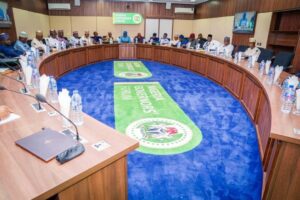
NAFDAC intensifies tracking mechanism to curb narcotic abuse
The National Agency for Food and Drug Administration and Control (NAFDAC) has disclosed that it is intensifying its efforts in developing tracking mechanisms from the pictures of production to curb substance abuse.
The agency in a statement on Sunday said it has put in place effective mechanisms to track and trace narcotic products right from the very source of production, the manufacturing plant, to the end user, the patient through narcotic drugs serialisation.
Prof Adeyeye noted that narcotics were chosen amongst other classes of drugs to make sure that we do not have drug or substance abuse in Nigeria or to mitigate it, adding that this will be replicated for all other NAFDAC-regulated drug products.
Going down memory lane, Prof Adeyeye recalled the ubiquitous misuse of Tramadol and Codeine all over the country when she got to NAFDAC in 2017 with their adverse effects on the mental health of young adults, children, and women that were selling codeine or tramadol.
“For the first six months of my tenure, I was running after tramadol or codeine because at that time,” she said
As a regulatory Agency saddled with the responsibility of ensuring the safety and quality of medicines, she stated that NAFDAC places utmost importance on good distribution practices as a core mandate of the agency is to ensure that the distribution of medical products along the pharmaceutical supply chain reflects best global practices.
She however regretted that one of the greatest challenges that we face today in the healthcare sector is the occurrence of substandard and falsified medicines.
She added that in Nigeria, this problem is further compounded by the chaotic drug distribution practices of unscrupulous elements of society who do not place a premium on human lives.
“These are the sharp practices that the Traceability project (Track and Trace) seeks to stop,” she maintained as she enthused that “Track and Trace (Traceability) is indeed a game changer.”
With this technology, she said medicines can now be tracked and traced right from the very source of production, the manufacturing plant, to the end user, the patient.
Through the scanning device on an Android phone, the NAFDAC boss said consumers can now verify the authenticity of the drug product they consume and be assured of the quality of medicines. More importantly, she said the track and trace technology is a veritable tool to be deployed in the event of medication recalls.
“The commissioning event of the project is a crystallization of a series of activities that the Agency embarked upon since May 2018, when we attended the very first GS1 Africa healthcare conference in Addis Ababa, Ethiopia. This led to the development and formulation of the Traceability Strategy Document, a five-year implementation roadmap for pharmaceutical products that was launched by the then Honourable Minister for Health in October 2020.”.
She said the narcotic drugs serialisation pilot project symbolises a significant milestone in the Agency’s commitment to delivering quality, efficacious, and easily verifiable medical products to the Nigerian consumer by adequately securing the drug distribution network.
She explained that the need to commence the track and trace of pharmaceutical products with narcotic medicines is a very strategic one, noting that Narcotic drugs occupy a very prime place in healthcare, and due to the very high propensity for abuse and diversion of this group of essential medicines cannot always be overruled.
The DG disclosed that the pilot project will be on for about one year, during which “we expect to have been familiar with all that will be necessary to enhance the deployment and full implementation of the track and trace project for other drug classes in scalable phases.”
Prof Adeyeye further stated that manufacturers must first commission the products they are registered to distribute into the NAFDAC Traceability System, and when it gets to the distributors or the wholesalers, they will also scan the products using a 2D Data Matrix barcode scanner to capture the event related to the movement of the product.
The NAFDAC boss said that all this will be captured in the Agency’s Information Traceability System so that if something goes off the track within the supply chain it would be easily traced and tracked and help in no small measure to reduce drug abuse.
The Managing Director of the technical partner, GS1 Nigeria, Mr. Tunde Odunlami, described the occasion as a very significant day in the history of traceability in Nigeria.
For GS1, he said that it has been a journey that started over ten years ago when the company started preaching the importance of traceability. He, however, commended NAFDAC for identifying the importance of this standard in transforming the way we do things in the country and enabling traceability and a good distribution system for the country.
“NAFDAC has taken the mantle as you can see today where we are now doing serialization of a very important class of medication which is Narcotics,” he said, as he explained the GSI standard and the role it will play in the system.
Mr. Odunlami further explained that GS1 provided the standard while Newsoft Nigeria Plc is the solution provider saddled with the responsibility of developing the solution and carrying out the implementation.



